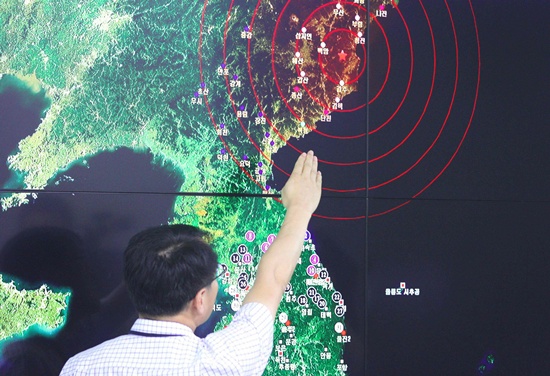
September 9, 2016
SEOUL (AFP) - North Korea conducted a fifth nuclear test on Friday, an underground blast that Seoul quickly labelled its "most powerful to date".
Here are some key questions around the blast and the isolated state's nuclear programme.
What do we know so far?
Seismologists detected a powerful artificial earthquake at 0030 GMT Friday, which they said was centred around Punggye-ri, North Korea's nuclear test site.
South Korea says it believes the quake was caused by the testing of a nuclear device, with a yield of 10 kilotons. That would make it the most powerful of Pyongyang's five nuclear tests to date.
Why have they carried out another test?
The North Korean leadership says a credible nuclear deterrent is critical to the nation's survival, claiming it is under constant threat from an aggressive United States.
Although it has regularly threatened neighbouring South Korea, its main priority is developing a effective strike threat against the US mainland.
It has always insisted it will continue testing, ignoring global condemnation and toughened UN sanctions.
Its first nuclear test was in 2006. That was followed by one in 2009 and another in 2013. The most recent test was in January this year.
Experts say the tests are likely aimed at refining designs and reliability as well as increasing yield.
Outside monitors will analyse the yield from Friday's test to try to determine whether it signals any fresh breakthrough.
How advanced is North Korea's weapons programme?
The four confirmed tests so far have resulted in artificial quakes of increasing size. Friday's quake followed that pattern, registering 5.3 magnitude.
Seoul said the 10-kiloton yield was the "most powerful to date".
The bomb that destroyed Hiroshima had a yield of 15 kilotons, and the most powerful nuclear test ever was a Russian blast in 1961 with an estimated yield of 50,000 kilotons.
Pyongyang claims its January test was of a miniaturised hydrogen bomb, which hsa the potential to be far more powerful than other nuclear devices.
However, scientists say the six-kiloton yield was far too low for a thermonuclear device.
But experts caution Pyongyang is clearly making progress -- regardless of whether or not it has mastered hydrogen bomb technology.
"With each test they can learn a lot," atomic scientist Siegfried Hecker said in January.
The claim of miniaturisation is a significant worry for the international community, especially in the light of an apparently stepped-up missile testing programme over recent months and years.
If Pyongyang can make a nuclear device small enough to fit on a warhead, and can bolster the range and accuracy of its missiles, it might one day achieve its oft-stated aim of hitting US targets.
How will the international community react?
Condemnation from the United States and its allies will likely be swift and sharp, and will almost certainly include calls for action from the United Nations Security Council.
However, the world will be watching most keenly for what China does.
Beijing has been North Korea's main diplomatic supporter and protector for decades, shielding its errant ally from harsh international action.
But its patience is running thin. It strongly opposes Pyongyang's nuclear programme, which it sees as a source of instability.
And China's seeming inability to rein in Kim Jong-Un is increasingly embarrassing for Beijing: the North's latest missile tests this week came as China was hosting a G20 summit.
However, Beijing's problem is that while it wants Pyongyang to stop causing trouble, it is desperate to avoid anything that might imperil the stability of the regime.
Its nightmare scenario is that if the regime collapses, millions of hungry North Koreans might flood over its border -- and the US-allied South would take over, meaning American troops could be stationed right on the Chinese border.



